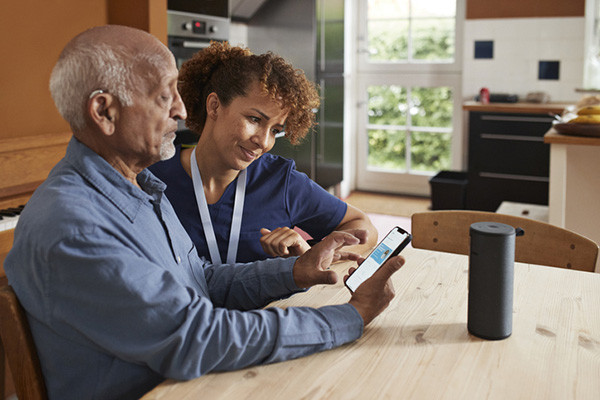Apps to accelerometers: Can technology improve mental health in older adults?
Technology can aid older adults’ mental health and medication management.

It can be devastating to watch older adults struggle with memory problems, low mood, anxiety, or a lack of motivation, particularly during times of physical distancing. With waiting lists for mental health appointments stretching for months, you may be wondering about alternatives.
Reaching out to family members or faith leaders may be helpful in talking through stressors. Alternatively, self-help books may provide skills or a new perspective for older adults choosing to keep their struggles private. But with the explosion of mental health mobile applications, telepsychiatry services, social media, and wearable technologies, where does technology fit in with treatment?
Combating ageist stereotypes
Seeing your loved one struggle with their computer, you may wonder whether to pursue technology-based treatments in the first place. Although older adults may be reluctant to use new technology due to stereotype threat (the fear of confirming negative stereotypes), a little help from loved ones can ease technology discomfort. The adoption of technology has grown rapidly over the past decade among older adults, and with it have come potential benefits to mental health, daily functioning, and quality of life.
Moving to virtual
A couple of years into the pandemic, older adults are increasingly seeing their doctors virtually. How well does this work for mental health? Thankfully, several studies have shown that virtual therapy is comparable to in-person treatment.
What about mobile apps that remove the human component? Here the data suggest that mobile apps can be complementary, although they are not sufficient as standalone treatments for mental illnesses.
Privacy
When navigating online treatments, you want to ensure that the platform used is HIPAA (Health Insurance Portability and Accountability Act)-compliant, which means your information is protected by law. Zoom and BlueJeans are HIPAA compliant; FaceTime and Skype are not. When using mental health mobile apps, read the privacy policies: red flags include sharing or selling information to third parties and using your information for advertisements.
Which apps can help older adults the most?
Navigating the explosion of mental health apps for online treatment can be tricky, as the landscape is changing quickly. For teletherapy services, Teladoc, K health, and Doctor on Demand are good places to start.
To supplement treatment of common mental illnesses, wellness apps developed by the federal government (including Mindfulness Coach, COVID Coach, and CBT-i Coach) can help teach skills, manage sleep, and track symptoms. Medisafe is the top-ranked medication reminder app for good reason: it has excellent privacy features (and with the premium subscription, you can receive medication reminders in celebrity voices).
Movement and mental health
We know that physical activity has numerous benefits on brain health in old age: it reduces anxiety and stress, it improves depressive symptoms, and it even strengthens learning and memory. Wearable technologies can play a role in helping older adults set physical activity goals. Through the use of smartwatches (which use accelerometers to keep track of movements), older adults can monitor how many steps they take, how many calories they burn, and even how well they sleep at night.
Wearable technologies have advantages for caregivers as well. They can be used to monitor their loved ones for wandering and falls, and they can alert them to changes in mood: a significant increase or decrease in usual activity levels may herald early signs of depression or anxiety.
Can smartphones be used to improve memory in older adults?
New research suggests that technology can indeed improve prospective memory, and help older adults with mild cognitive impairment continue their daily activities. Through the use of a personal assistant application on their smartphone (a digital voice recorder or reminder app), older adults who received reminders about events and activities experienced memory benefits and improvements in their activities of daily living.
Tips for using technology with older adults
While the benefits and harms of using technologies are still being studied, you can try the following:
- Encourage older adults to try out applications that are research-informed, especially if they express interest.
- If using a mobile health app, make sure to read the privacy policy. If using an online mental health platform, ensure it is HIPAA-compliant.
- Try to set physical activity goals, as physical activity helps improve symptoms of almost every mental illness. Wearable technologies that count steps are a good place to start.
- Modify device settings to improve comfort: this can include optimizing volume and font size to accommodate changes in vision or hearing.
If mental health technology doesn’t suit your loved one, that’s okay — technology is not always the answer. Treatments are most likely to work when patients believe it will help and can stick with it.
